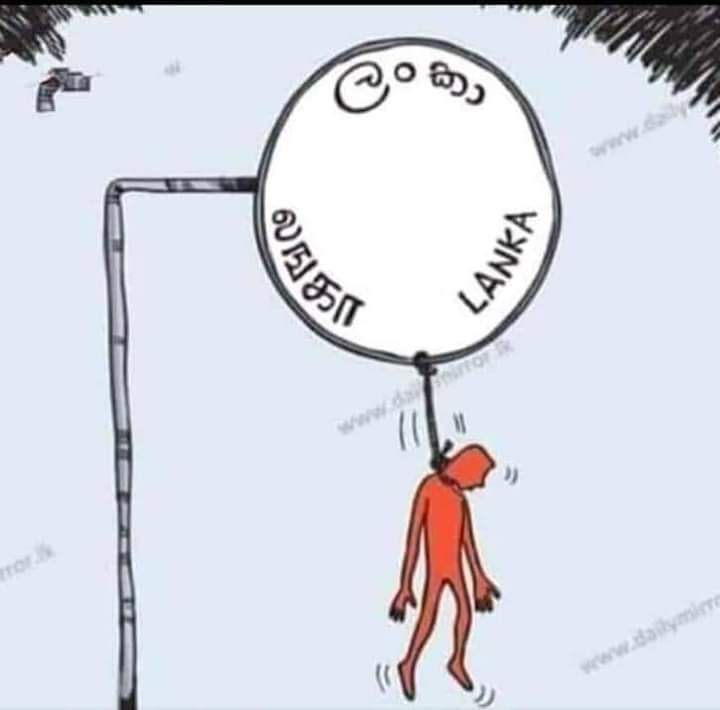Sri Lanka expects to run out of fuel in days, prompting the government to close schools in Colombo and order government employees to work from home, while troops handed tokens to people lining up for petrol to keep their places in the queue.
Sri Lanka is suffering its worst economic crisis in seven decades, with foreign exchange reserves at a record low and the island of 22 million struggling to pay for essential imports of food, medicine and, most critically, fuel.
Industries like garments, a big dollar earner in the Indian Ocean nation, are left with fuel for only about a week to 10 days.
Public transport, power generation and medical services will get priority in fuel distribution, with some rationed to ports and airports.
“I have been in line for four days, I haven’t slept or eaten properly during this time,” said autorickshaw driver W.D. Shelton, 67, one of those who received a token meant to hold his place in the queue for when fuel becomes available.
“We can’t earn, we can’t feed our families,” added Shelton, who was 24th in line at a fuel station in the centre of Colombo, but set to stay there as he had no petrol for the journey to his home just 5 km (3 miles) away.
The government is talks with the IMF on a possible bailout, but many people can’t wait that long. The navy in the early hours of Monday arrested 54 people off the eastern coast as they tried to leave by boat, a spokesman said, on top of 35 “boat people” held last week.
Embattled President Gotabaya Rajapaksa’s elder brother resigned as prime minister last month after clashes between pro- and anti-government protesters spiralled into countrywide violence that left nine dead and about 300 people injured. An escalation of the fuel shortage could lead to a fresh wave of demonstrations.
Opposition leader Sajith Premadasa called for the government to step down.
“The country has collapsed completely due to the fuel shortage,” he said in a video statement. “The government has lied to the people repeatedly and has no plan on how to move forward.”
POWER CUTS
The government fuel stockpile stands at about 9,000 tonnes of diesel and 6,000 tonnes of petrol, the power minister said on Sunday, but no fresh shipments are due.
Lanka IOC, the local unit of Indian Oil Corporation, told Reuters it had 22,000 tonnes of diesel and 7,500 tonnes of petrol, and was expecting another 30,000 tonnes shipment of petrol and diesel combined around July 13.
Sri Lanka consumes about 5,000 tonnes of diesel and 3,000 tonnes of petrol a day just to meet its transport requirements, Lanka IOC chief Manoj Gupta told Reuters.
Other big consumers are industries like apparel and textiles companies, whose exports jumped 30% to $482.7 million in May, according to data released on Monday.
“We have enough fuel for the next seven to ten days, so we are managing,” said Yohan Lawrence, secretary general of the Sri Lanka Joint Apparel Associations Forum.
“We are watching and waiting to see if fresh fuel stocks arrive and what will happen in the coming days.”
Sri Lanka’s power regulator said the country was using its last stocks of furnace oil to run multiple thermal power plants and keep power cuts to a minimum. Scheduled power cuts will rise to three hours from Monday from two and a half hours earlier.
“We are hoping to keep power cuts at three to four hours for the next two months,” said Janaka Ratnayake, chairman of the Public Utilities Commission of Sri Lanka. “But given the situation of the country this could change.”
FINANCIAL HELP
The government has told employees to work from home until further notice, while schools have been shut for a week in the commercial capital of Colombo and surrounding areas.
Fuel station queues have grown rapidly since last week.
A team from the International Monetary Fund is visiting Sri Lanka for talks on a $3 billion bailout package. The country is hoping to reach a staff-level agreement before the visit ends on Thursday, that is unlikely to unlock any immediate funds.
It has received about $4 billion in financial assistance from India and the Sri Lankan government said on Monday the United States had agreed to provide technical assistance for its fiscal management. (Reporting by Uditha Jayasinghe; Writing by Uditha Jayasinghe and Krishna N. Das; Editing by Clarence Fernandez and Nick Macfie)


